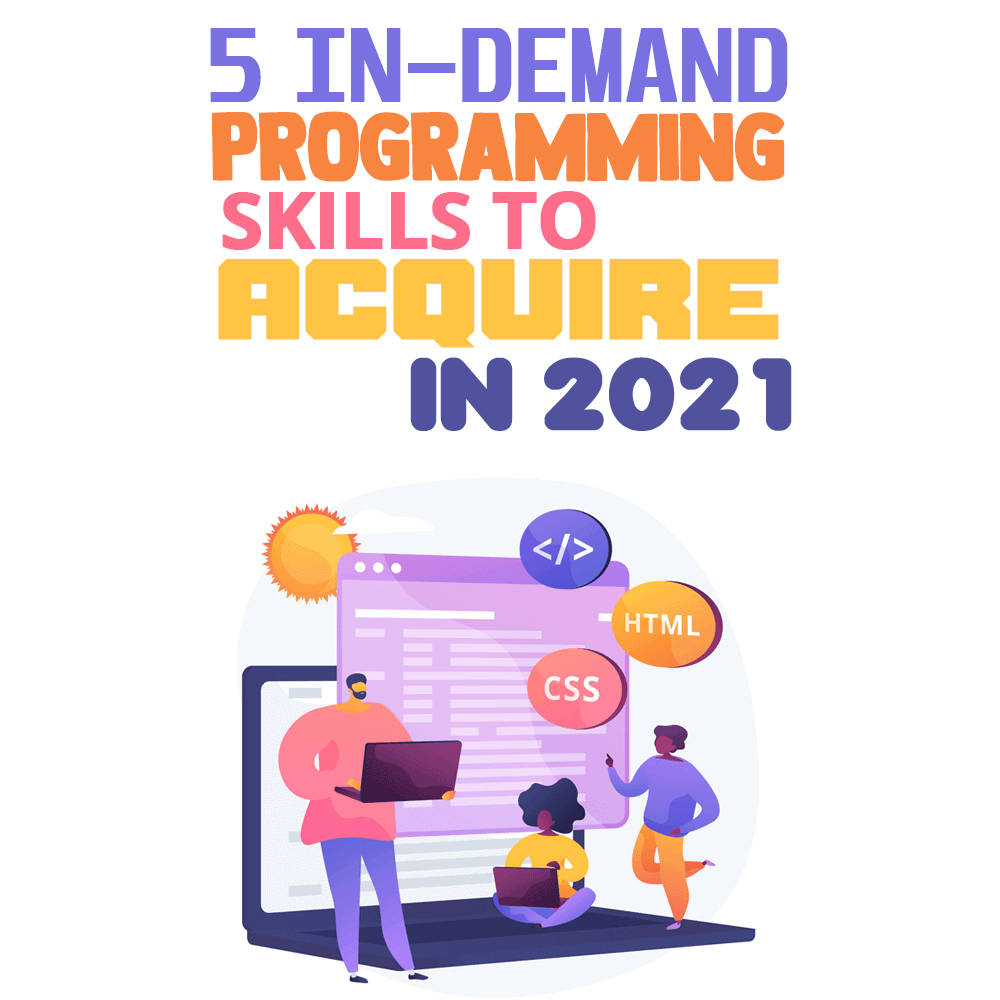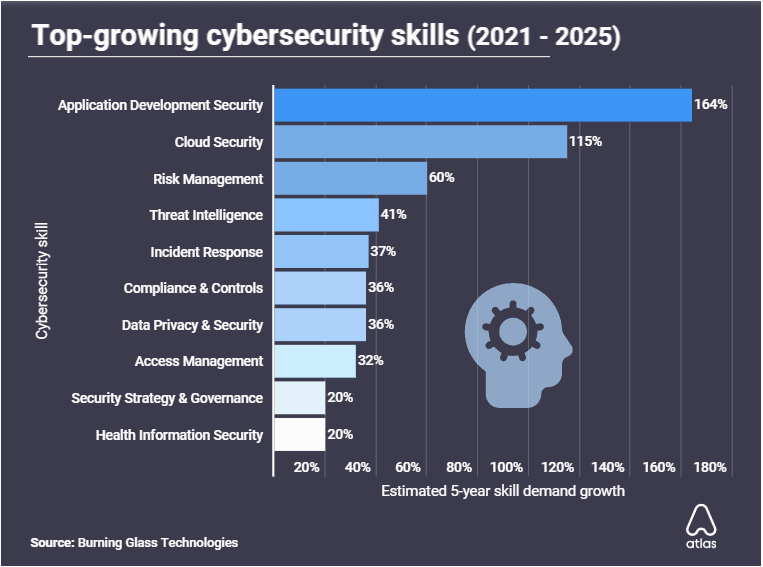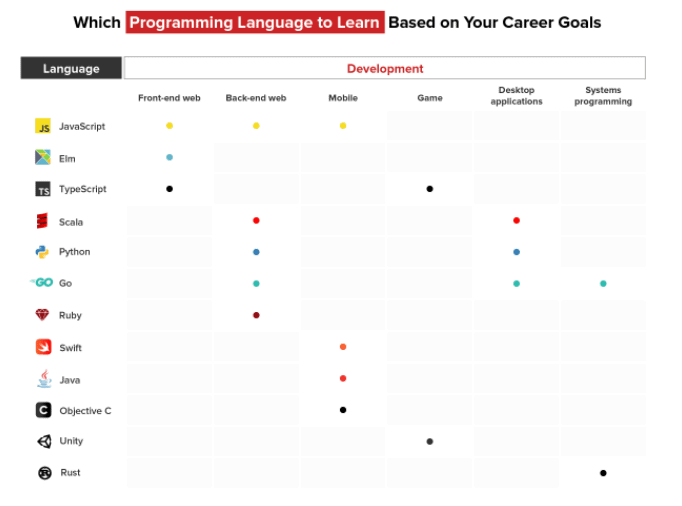 As we progress into 2021, a quick glance at the most in-demand tech jobs reveals that security professionals are at the top, with approximately $213,000 annual income for the 95th percentile. This job market is reflective of the evolving technology landscape that offers lucrative opportunities for fresh graduates or even experienced programmers who want to learn the latest trends.
As we progress into 2021, a quick glance at the most in-demand tech jobs reveals that security professionals are at the top, with approximately $213,000 annual income for the 95th percentile. This job market is reflective of the evolving technology landscape that offers lucrative opportunities for fresh graduates or even experienced programmers who want to learn the latest trends.
Despite the growing tech market, the chances of landing your dream job may be slim due to a skills mismatch. The main reason for a mismatch is that job seekers are not offering the skills employers are looking for.
In order to overcome this challenge, young professionals should aim to build their skills for a specific niche rather than trying to excel in everything. Developing a tailored skill set will be more helpful in securing a job best suited to your capabilities.
So what skills should you work on to find a suitable career path for yourself in 2021? The market demand is changing constantly due to evolving trends over time. However, learning the latest skills in the industry enables you to remain relevant and increases your chances of getting hired. This blog will help you discover the five high-in-demand programming skills to learn this year and tips on how you can excel in them.
Cybersecurity for the Cloud
Cloud adoption, triggered by the post-pandemic, work-from-home situation, is expected to increase in the year 2021. Unfortunately, the transition to cloud does not come without challenges.
Data breaches along with regulatory compliance perils have led companies to propose a greater budget for cybersecurity practices. Increased threats coupled with the lack of Information Technology (IT) expertise within firms only confirm that cybersecurity threats will get worse over time.
The good news, however, is that cybersecurity is a great area to focus on for your future career aspirations. Known as a fascinating branch of IT, cybersecurity is ideal for people who enjoy challenges. A cybersecurity engineer requires much more than just a degree in IT.
A proficient cybersecurity engineer has a strong command over programming languages like C++, PHP, Python, and Pearl. Experience with functionality, operation, and maintenance of firewalls and endpoint security is definitely a plus.
Pro Tip: If you possess outstanding programming skills and have an excellent knack for working in a fast-paced environment (read under pressure), then cybersecurity is the field for you.
With the cost of cybercrime rising to $6 trillion globally in 2021, the demand for cybersecurity professionals to tackle threats has tremendously increased. According to The New York Times Report, there are an expected 3.5 million cybersecurity job openings around the world in 2021. Looks quite promising, right?

Despite being one of the high-in-demand programming skills, cybersecurity still faces a lack of trained professionals in the field. Lucky for you, it’s not that hard getting yourself certified for these jobs. There are a couple of valuable certifications you can get to make yourself eligible for the cybersecurity career path.
The first one is CompTIA Security+—an entry-level training suitable for IT professionals new to cybersecurity. Next is the Certified Information System Security Professional (CISSP) course. The CISSP training requires three to five years of work experience and is considered a salary booster for serious programmers looking to upgrade their skill set.
Artificial Intelligence (AI) and Machine Learning (ML)
According to a Burning Glass Technologies survey, the two highest paying tech jobs in 2021 are IT Automation and AI and ML with 197,810 positions open today. The rapid expansion of AI and ML can be attributed majorly to the post-pandemic work environment. With businesses connected on the digital front, many organizations have adopted AI in at least one function.
There is no doubt AI and ML are going to be big in 2021. This only means one thing for the programmer community: exciting learning opportunities. In order to enter the field of AI and ML, you should be well-informed about the ongoing trends.
The biggest transition is going to be toward workplace AI, where companies have opted for AI to reduce deficiencies in both office and home-based workers. Moreover, in order to prevent unwarranted actions, businesses will only commit to partners with ethical AI practices.
For AI enthusiasts, the road to a successful career requires persistent commitment. If you are just beginning your graduate study, then aim to opt for a degree in Computer Science and Mathematics with a focus on popular coding languages.
Becoming an AI engineer requires a strong grasp of both technical and nontechnical skills. While technical knowledge covers programming languages like R, Python and Java, the nontechnical side focuses on industry know-how and communication skills.
Apart from new learners, the AI and ML industry is also an attractive choice for current software engineers. As someone with the required technical background, you are already one step ahead in the battlefield, and with a few additional courses on your resume, you will be eligible to apply for jobs in the AI field. You can enrol in courses from top-tier online sources like Google Learning and Udacity.
A fast-growing industry may offer ample job opportunities, but it is entirely up to you to build up your programming skills and knowledge. Remember, there are no quick shortcuts to a better future— instead work hard and stay motivated throughout your journey.
The Rust Programming Language
Every software engineer has a sound knowledge of popular programming languages like Python and JavaScript. The reason being that these languages have a wide number of applications and have been in use for many years.
But 2021 has something new in store for aspiring programmers. A Developer Survey by Stack Overflow in 2020 found out that Rust was the most loved programming language for the fifth year in a row.

Rust has gained prominence in the past few years, as it claims to be a suitable alternative to C++ for system programming needs. For this purpose, Rust is an excellent choice for developers looking for problem-solving techniques while working on large scale applications. For efficient programming, Rust offers high performance by helping developers eliminate bugs caused by C++.
As developers have spent a lot of time working on the language, Rust is considered user-friendly, unlike other languages. This is a big plus point and a great option for programmers looking to learn a new language in the coming years.
With a focus on safety and structure, Rust is likely to dominate markets in the future, so if you are thinking of learning Rust, don’t postpone it any longer. There is an entire website dedicated to helping new developers learn Rust, with three main options available. The first step is to go by the Rust programming language book.
For those looking for a more practical approach, there is a Rustlings course available with projects to give a hands-on experience. The third option is the Rust by Example guide, which illustrates concepts most vital for Rust. The good news is that all these resources are free. So there really is no excuse for not learning the language of the future.
Development Operations (DevOps)
By definition, DevOps is a set of practices that aims to streamline software development and IT operations. With the ability to shorten software development life cycles and run high-quality software, DevOps is rapidly gaining popularity. The demand for DevOps is driven by the competition for lower costs, increased flexibility, and fast product delivery. Due to its innovative nature, the market for DevOps is predicted to grow by 22.9% from 2020 to 2027.
If you want to gear up for future technologies, DevOps is definitely an exciting skill to learn in 2021. Careerwise, a DevOps engineer possesses knowledge of automation tools for various digital platforms of an organization.
With a heavy focus on automation, DevOps engineers are required to master coding and scripting with languages like Python, Java, Perl, Ruby and PHP. If reading this makes you curious to learn more, add DevOps to your list of programming skills to acquire this year.
Whether you’re a new software developer or have years of experience with operations, the best time to start the transition to DevOps is right now. A deep understanding of developer tools already gives you a head start on your way to becoming a DevOps engineer. You don’t need to leave your current job right away; instead build your skills until you land the job you want.
Critical thinking as a problem solver will help you go a long way in the field of DevOps. Learn, evolve, and most importantly don’t forget to question. You can always get a professional certification if you feel passionate about starting your career as a DevOps engineer.
Responsive Web Design
Audiences in 2021 use multiple gadgets to access online content. In order to enhance user experience, responsive web design is a must. Since the majority of consumers use their mobile devices to scroll through websites, companies that don’t pay attention to website adaptability are going to lose out.
Creating a responsive website means keeping up with the latest trends in the market. The key is to captivate the audience and make them stay longer for a smart scroll experience.
In 2021, parallax animation is expected to be popular due to its resonance with reality. The next following trend for 2021 is expected to be neumorphism—minimalist realism. As the hype of 3D icons on websites grows, neumorphism is likely to make its impact and take the audience by awe.
Learning responsive web design practices is definitely an upgrade to a front-end developer’s programming skills. Any website that is being used on various platforms needs to be super responsive. So if you are a front-end developer struggling to create a seamless UI experience for users, then responsive web design is the skill for you.
A responsive UI is no longer optional, it’s a requirement companies have to fulfil if they wish to build their online presence successfully. Don’t stress out if you don’t know much about responsive designs; you can always start today. There are various actionable tools available to help you improve upon web development, hence, increasing customer experience.
For developers who wish to start from scratch, there is always the option of extensive courses. Even if you get certified, the best lessons come from observation. Go and check how famous UI/UX designers are working and what techniques they are using. Once you get an idea of what works, you can always adopt it along the lines of your company requirements.
Upgrade Your Programming Skills for a Better Future
2021 looks hopeful for the tech industry. There are many high-paying career paths available for developers, so choose what sparks your interest. If you are looking to switch careers or add a new skill to your resume, get started right away. It is never too late to enrol in a new course or sign up for a project to gain some practical knowledge.

In this way you will be able to enhance your experience, making yourself eligible for advanced-level career paths as well. A 100% investment in a single niche is likely to be more rewarding that a 10% investment at 10 different industries
Moreover, to amp up your skill set even further, try to specialize in areas that require human qualities like creativity, critical thinking, and empathy. These qualities are classified as soft skills and are equally important for a developer looking to progress in the tech industry.
The key to making the complex simple is to lay down your goals and objectives for the year and then devise a roadmap to accomplish them. Don’t forget to add deadlines and get feedback. And lastly, don’t be too hard on yourself. You don’t always have to win the first time—Stay dedicated and consistent to achieve your targets.
